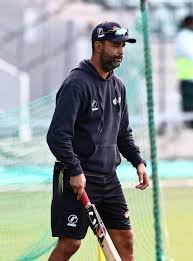Maharaj says ‘I don’t want to call myself old’, but his wisdom is key for the Proteas 0
“I don’t want to call myself old,” Keshav Maharaj says in a light-hearted aside moments after being named the Proteas Players’ Player of the Year at the recent Cricket South Africa awards evening. But at 34-years-old, the left-arm spinner undoubtedly plays a key role as a figure of wisdom and maturity in a team that is going through a period of transition.
Complicating this time of change for those who play in both red and white-ball formats, as Maharaj does, is the fact that the Test, ODI and T20 squads are all in very different places.
South Africa’s Test team is fourth in the ICC rankings, but is currently in seventh position in the World Test Championship and are seriously short-changed in terms of opportunities to play the five-day format. The ODI team is third in the rankings, boosted by their encouraging semi-final appearance in the 50-over World Cup last year, but questions remain over senior players like Quinton de Kock, Anrich Nortje and Rassie van der Dussen and the lure of T20 leagues.
The Proteas recently achieved their best showing in an ICC global event when they reached the final of the T20 World Cup in the West Indies, but they are only ranked sixth in that format, with consistency being their main issue as the squad is constantly rotated.
Maharaj, as one of the leadership inner core (he has led the Proteas in seven ODIs and five T20s), says however that he feels South Africa are holding steady if not progressing, thanks to the refreshing influence of some new talent and the continued drive of the seniors.
“We have a good blend of youth and experience and we are finding a way to navigate not only playing international sport but also the transition period we are obviously in,” Maharaj told sportsboom.com.
“It’s not easy when you’re trying to blood talent, but there’s stability in the core, some continuity, we are finding combinations so we don’t have to suddenly look for those at World Cups. There’s role clarity from the coaches and we have two brilliant leaders in Temba Bavuma and Aiden Markram.
“I don’t want to call myself old, but for us older guys it’s not always easy with new families that you see for two weeks and then you’re away for eight weeks. But we still love what we do, we are still motivated, patriotic and passionate about what we can do for the country. That’s what spurs us on.
“So with that senior core and how quickly the youngsters are coming through, it’s encouraging that we are still producing results. And the enjoyment of playing together shows too, we work as one unit, motivated to win in all three formats,” Maharaj said.
In terms of personal motivation, Maharaj is probably the complete left-arm spinner already, but he is constantly at work, tinkering and massaging his game. Dedication and work-ethic are his trademarks and in the last season he took 26 wickets in 17 ODIs, conceding just 4.21 runs-per-over; 13 scalps in 10 T20s at 6.88 runs-per-over; and he was the player of the series in the recent Tests in the West Indies, taking 13 wickets in the two matches, at an average of just 16.07.
“I love what I do and I just love the game, so I am still trying to get better and working really hard. I just keep trying to evolve whether that is mentally or in terms of tactics, or subtle changes to my bowling. That includes my batting even though that is yet to pay dividends and the form comes and goes. In cricket, 1+1 doesn’t always equal 2, that’s the way the game goes,” Maharaj chuckled.
“But I just try to be one step ahead. The easy part is getting here, the hardest thing is to stay here. So it’s not about bowling for two hours in the nets, it’s about those six-hour shifts trying to figure out your game. Because out in the middle you are responsible for your own destiny. You have to self-learn because you are alone in the middle, it’s all you, the batter and the ball.”
